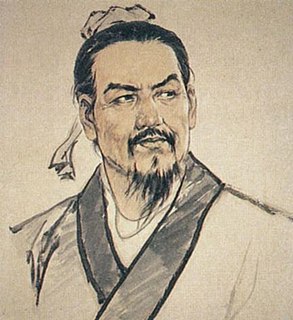A Quote by Nicholas Sparks
As Confucius once said, 'He who does nothing is the one who does nothing.'" Gabby pondered the words, the furrowed her brow. "did Confucius really say that?" Sunglasses in place, Stephanie managed the tiniest of shrugs. "No, but who cared? The point is, they handled, and most likely they found some sort of self-satisfaction in their industrious-ness. Who am I to deprive them of that?
Related Quotes
Here is an example of Confucius sayings: "It does not matter how slowly you go so long as you do not stop." In a few words, Confucius teaches us about patience, perseverance, discipline, and hard work. But if you probe further, you will see more layers. Confucius' philosophies have significantly influenced spiritual and social thought. His views bear insight and depth of wisdom. You can apply his teachings in every sphere of life. Confucius' profound teachings are based on humanism.
He who dreams ... does not know he is dreaming... . Only when he awakens does he know he has dreamt. But there is also the great awakening (ta-chiao), and then we see that [everything] here is nothing but a great dream. Of course, the fools believe that they are already awake-what foolishness! Confucius and you, both of you, are dreams; and I, who tell you this, am also a dream.
Tzu Chang asked Confucius about jen. Confucius said, "If you can practice these five things with all the people, you can be called jen." Tzu Chang asked what they were. Confucius said, "Courtesy, generosity, honesty, persistence, and kindness. If you are courteous, you will not be disrespected; if you are generous, you will gain everything. If you are honest, people will rely on you. If you are persistent you will get results. If you are kind, you can employ people.
Kong Qiu, or Master Kong as he was known, did not live to see his days of glory. During his lifetime, his views were received with scorn. But that was about two thousand five hundred years ago. A handful of his dedicated followers passed on Confucius' teachings to future generations.
After Confucius' death, his followers published his teachings in the book, The Analects of Confucius.
Once Confucius was walking on the mountains and he came across a woman weeping by a grave. He asked the woman what here sorrow was, and she replied, We are a family of hunters. My father was eaten by a tiger. My husband was bitten by a tiger and died. And now my only son! Why don't you move down and live in the valley? Why do you continue to live up here? asked Confucius. And the woman replied, But sir, there are no tax collectors here! Confucius added to his disciples, You see, a bad government is more to be feared than tigers.
A saint a real saint never does anything, a martyr does something but a really good saint does nothing, and so I wanted to have Four Saints who did nothing and I wrote the Four Saints In Three Acts and they did nothing and that was everything. Generally speaking anybody is more interesting doing nothing than doing something.
You said, 'I love you.' Why is it that the most unoriginal thing we can say to one another is still the thing we long to hear? 'I love you' is always a quotation. You did not say it first and neither did I, yet when you say it and when I say it we speak like savages who have found three words and worship them. I did worship them but now I am alone on a rock hewn out of my own body.
She tore a page from the book and ripped it in half. Then a chapter. Soon, there was nothing but scraps of words littered between her legs and all around her. The words. Why did they have to exist? Without them, there wouldn't be any of this. Without words, the Führer was nothing. There would be no limping prisoners, no need for consolation or wordly tricks to make us feel better. What good were the words? She said it audibly now, to the orange-lit room. "What good are the words?





































